Have you ever heard of alum powder?
Perhaps you’ve noticed it as an ingredient on a recipe or in your local grocery store, but are unsure of what to do with it or how to substitute it if needed.
Alum powder is used mainly as a leavening agent to increase the rise and lighten the texture of baked goods.
While knowledgeable bakers use alum powder frequently, those just getting started in their baking adventures might feel perplexed about its uses.
However, there are plenty of options for reasonable substitution.
If you’re ever curious about cooking and baking with alum powder, including five great substitutes, look no further.
What’s Alum Powder?

Alum powder is a type of salt made from various compounds, such as potassium aluminum sulfate, ammonium aluminum sulfate or sodium aluminum sulfate.
It’s used as an additive in baking, but it’s also used for a variety of other applications such as bleaching, textiles and purifying water.
In baking, alum powder functions similarly to baking powder or baking soda.
It helps to leaven pastries like muffins and biscuits and also serves to improve the texture, flavor and appearance of the end result.
Because of its ability to tenderize dough and enhance taste, alum powder is quite popular in the food industry but it can also be found in some home kitchens too.
Alum powder is usually combined with other ingredients such as bicarbonate of soda and cream of tartar.
The combination creates a tenderizing action that helps to soften gluten strands present in the dough, creating a nice texture which is often light and fluffy.
As an additive, alum powder may also help improve resistance against mold growth when added at correct concentrations.
Is Alum Powder the Same as Baking Soda?
No, alum powder is not the same as baking soda.
Alum powder, otherwise known as potassium alum or potassium aluminum sulfate, is a chemical compound made of potassium, sulfur, and aluminum.
It has a white crystalline surface and is generally used in small amounts as an astringent in beauty products and for food preservation.
Baking soda is a leavening agent used in baking to make certain recipes rise while creating light and fluffy texture.
Though they may appear similar to the untrained eye due to their white appearance, baking soda and alum powder are two entirely different substances with vastly disparate properties.
The 5 BEST Substitutes for Alum Powder
While alum powder has many practical applications, it is not the only product that can be used for these purposes.
There are several alternatives you may have around your kitchen or home that can provide similar benefits as alum powder, making them ideal substitutes if you find yourself short on time and resources.
1 – Pickling Spice
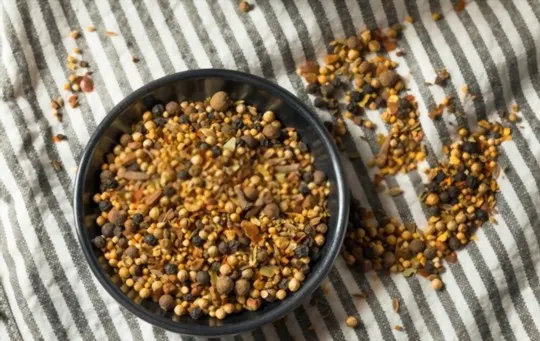
Picking spice—which is made with a combination of herbs, salt, and all-spice—is one of the most popular substitutes for alum powder.
As a spice blend, it’s not only used in the pickling process to season and preserve food, but can also be used in a variety of other dishes as well.
Pickling spices usually include whole or ground cinnamon, allspice, ginger, mustard seed, red pepper flakes, and coriander.
Some mixers might also include cardamom seeds or bay leaves.
Depending on the recipe you’re making and the quantity of alum powder you require, you can use either whole or ground pickling spices as desired.
This substitute works wonders when added to jams and jellies that need to stay preserved for longer periods of time without going bad or souring quickly.
The addition of pickling spices can also greatly enhance the flavors in your dish.
2 – Cream Of Tartar
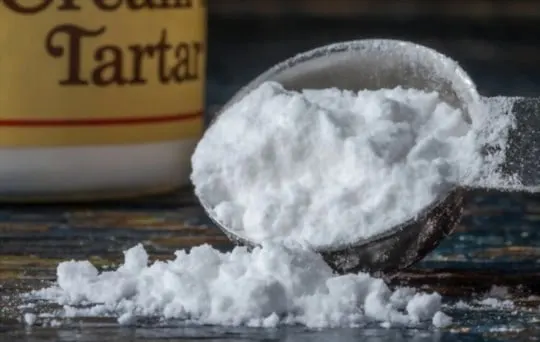
Cream of tartar, also known as tartaric acid or potassium bitartrate, is a white powder that is found in the bottom of red wine barrels while they’re aging.
It is made from a residue that forms on the walls of wine containers during the fermentation process.
Cream of tartar not only functions as an alum powder substitute, but it also has a number of other benefits, including helping to regulate pH levels in some products.
However, its acidic nature makes it inappropriate for many uses where alum powder would normally be used – such as pickling and preserving food products.
3 – Arrowroot Powder and Citric Acid
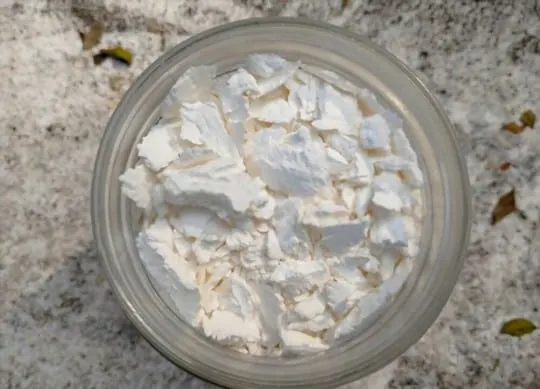
Arrowroot powder is a fine-textured, white starchy powder derived from the roots of tropical American plants, namely Maranta and Curcuma.
It is a useful ingredient for making sauces and gravies, as it has good thickening properties at a relatively low temperature.
It also works well as an egg Replacer and for thickening fruit pie fillings.
Citric Acid is another commonly used substitute for alum powder.
It is an acid found naturally in citrus fruits like oranges, lemons, limes and grapefruit, but is also synthetically produced in various forms through fermentation processes.
Citric acid acts as an antioxidant to prevent spoilage of food products and contributes tartness to them as well.
When combined with baking soda and water, it can create a solution that performs some of the same functions that alum powdered does-it prevents discoloration in pickles or cured meats and helps firm the outer texture of products like jams or jellies.
However, citric acid is less shelf stable than alum powder so users will need to plan use accordingly if substituting this ingredient in recipes that require a long shelf-life.
4 – Lime
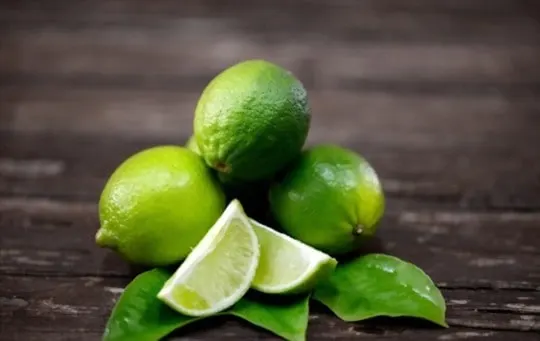
Lime is a great substitute for alum powder in pickling recipes because it serves the same purpose as alum – to enhance the crunchiness and flavor of pickles.
While lime is not as acidic or astringent as alum, it does have some sourness and bitterness that will be imparted to pickles made with it.
When using lime it’s important to note that hydrated lime should never be used as this type of lime can have toxic effects and imparts an off-flavor to the pickles.
Instead, use food-grade lime – either fresh or dried – for your favorite pickle recipes.
Simply dissolve 2 tablespoons of the powdered form in 1 quart of water, enough for two quarts of cucumbers.
If using fresh lime or calcium carbonate, follow your recipe’s instructions carefully.
5 – Ascorbic Acid
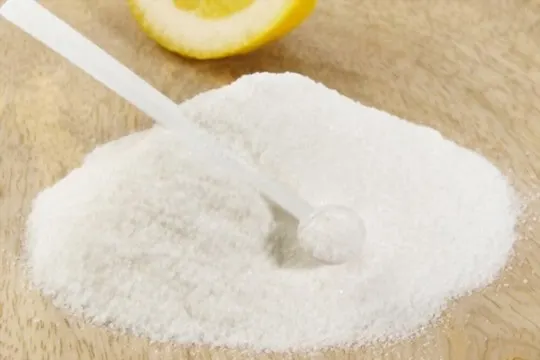
Ascorbic Acid, also known as Vitamin C, is a very effective alternative to alum powder.
Not only does it work as an effective raising agent in baking, it also has health benefits for you and helps to increase the shelf-life of baked items.
Ascorbic acid is available in most local grocery stores and drugstores, and can be used as an alum powder substitute by measuring out the same amount as you would your alum powder (e.g. 1 teaspoon of ascorbic acid for every 1 teaspoon of alum powder).
It should be kept in mind that while this is an effective substitute ingredient, it doesn’t impart the same flavor or texture qualities like alum powder so may not produce exactly the same results when baked.
Conclusion
Alum powder is an age-old ingredient used in many traditional recipes and preparations.
It can be a great addition to your culinary palette if used correctly.
Whether you’re looking for a substitute due to dietary restrictions or because you are unable to find it at your local store, there are plenty of good alternatives available.
Remember that when using any of these substitutes, we recommend using half the measurement that was originally called for in the recipe.
This will help ensure texture and taste consistency with minimal alteration.
We also recommend doing some research into which is best suited for your specific dish prior to swapping out ingredients.
Follow these guidelines and you should have no problem finding an adequate replacement for alum powder.
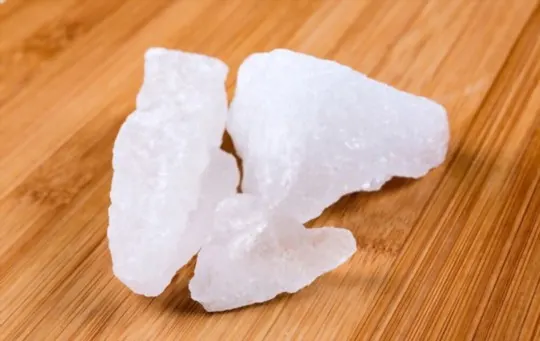
The 5 BEST Substitutes for Alum Powder
Ingredients
- Pickling Spice
- Cream Of Tartar
- Arrowroot Powder and Citric Acid
- Lime
- Ascorbic Acid
Instructions
- Choose your preferred substitute from the list of options.
- Organize all of your ingredients.
- Use the proper substitute to cook your recipes.
